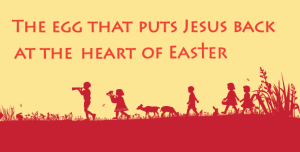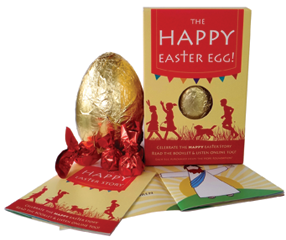
By Ann Marie Foley - 28 February, 2018
 The Happy Easter Egg is back again this year with a taste of delicious Irish chocolate but also of the true meaning of Easter.
The Happy Easter Egg is back again this year with a taste of delicious Irish chocolate but also of the true meaning of Easter.
Julie Carvill came up with the idea in 2015, and has seen its popularity grow each year. It was from a sense of dismay that she started. Reading about a survey taken among children in the UK, she was shocked that 25% of those surveyed thought Easter was the Easter Bunny’s birthday and 27% thought it was celebrating the day on which chocolate was invented.
“It might not be those percentages in Ireland but I fear it is going in that direction,” she told Catholicireland.net. “We do have the tradition of Lent in Ireland, and of giving things up, but some people think Lent is for dieting, or good for your health rather than really knowing what is the significance of Lent and Easter.”
She came up with the idea of including in the box with the Easter Egg, rhymes, readings and illustrations that tell the true story of Easter, the Resurrection, and the message of Jesus.
She is pleased with the orders so far, but the deadline for ordering is 5th March. That means that parishes wishing to order have just next weekend to take orders. The eggs can be ordered by individuals or parishes via the website or telephone. In parishes, a designated person can download posters and an order sheet from the website to display around the church and parish. Once all the orders are taken and sent on to Julie Carvill, she will ensure that they are delivered during the week before Easter.
Julie Carvill sells the Happy Easter Egg to both Catholic and Church of Ireland parishes and dioceses, and to other organisations. Parishes buy a batch of eggs for altar servers or a youth or children’s group or for parishioners who might want them for family members or neighbours. She was delighted when she received an order this year for more than 200 from a businesswoman who wants to give the eggs to her staff for Easter.
“I thought that was great because my dream is that more people might give them to folk who might never think of God or church, or have a clue what Easter is about,” she said. “I’d love to see them given by people to the grandchildren who no longer go to Mass or the neighbour’s children or nephews and nieces.”

The Happy Egg has also featured in a Belfast news paper this year, and she is hopeful that there may be orders from Northern Ireland. She would love to see the eggs sell on the whole island of Ireland.
The Happy Easter Egg website has a video of the story of Easter with Irish actors and music. It also has readings, music, and competitions. Julie who owns a small Christian book selling business in Co Wicklow, has built up the website adding new items about Easter every year. For example, one year she got permission to include the poetry and prose writings of a local writing workshop which portray Easter from a variety of perspectives. One tells the Easter story from the point of view of the cock who crowed and another expresses the story in the voice of the serving girl.
The quality chocolate egg and honeycomb crisp milk chocolates (total 195g) cost €8/£7, are made in Ireland using ethically sourced cocoa beans, and supports Irish businesses. For every Happy Easter Egg purchased, 10 cent is donated to the Hope Foundation, an Irish Charity which helps deprived children in Kolkata, India.
For more information go to www.happyeasteregg.ie or telephone 085 229 3722.